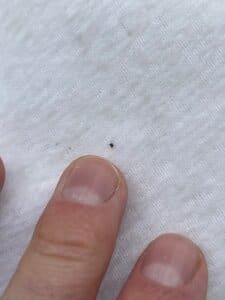Ticks go through 4 life stages: egg, larva, nymph, and adult. Spring and early summer are when tick nymphs are most active and they can be infected with the same diseases as adults. Tick nymphs are smaller than adults, which can make them more difficult to detect when they’re crawling on you or after they bite. When you spend time outdoors, use an EPA approved repellent and check yourself, your pets, and your gear for ticks. If you find a tick has bitten you, remove it as quickly as possible using tweezers or a specialized tick removal tool. For more information, visit CDC Tick Bite Prevention

